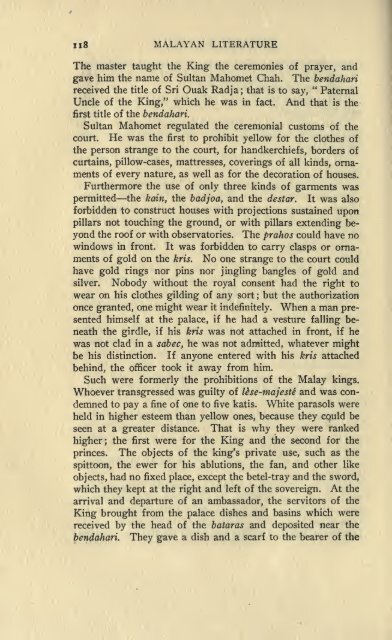Malayan literature; comprising romantic tales, epic poetry and royal ...
Malayan literature; comprising romantic tales, epic poetry and royal ...
Malayan literature; comprising romantic tales, epic poetry and royal ...
Create successful ePaper yourself
Turn your PDF publications into a flip-book with our unique Google optimized e-Paper software.
Ii8<br />
MALAYAN LITERATURE<br />
The master taught the King the ceremonies of prayer, <strong>and</strong><br />
gave him the name of Sultan Mahomet Chah. The bendahari<br />
received the title of Sri Ouak Radja; that is to say, " Paternal<br />
Uncle of the King," which he was in fact. And that is the<br />
first title of the bendahari.<br />
Sultan Mahomet regulated the ceremonial customs of the<br />
court. He was the first to prohibit yellow for the clothes of<br />
the person strange to the court, for h<strong>and</strong>kerchiefs, borders of<br />
curtains, pillow-cases, mattresses, coverings of all kinds, ornaments<br />
of every nature, as well as for the decoration of houses.<br />
Furthermore the use of only three kinds of garments was<br />
permitted— the kain, the badjoa, <strong>and</strong> the destar. It was also<br />
forbidden to construct houses with projections sustained upon<br />
pillars not touching the ground, or with pillars extending beyond<br />
the roof or with observatories. The prahos could have no<br />
windows in front. It was forbidden to carry clasps or ornaments<br />
of gold on the kris. No one strange to the court could<br />
have gold rings nor pins nor jingling bangles of gold <strong>and</strong><br />
silver. Nobody without the <strong>royal</strong> consent had the right to<br />
wear on his clothes gilding of any sort ;<br />
but the authorization<br />
once granted, one might wear it indefinitely. When a man presented<br />
himself at the palace, if he had a vesture falling be-<br />
if he<br />
neath the girdle, if his kris was not attached in front,<br />
was not clad in a sabec, he was not admitted, whatever might<br />
be his distinction. If anyone entered with his kris attached<br />
behind, the officer took it away from him.<br />
Such were formerly the prohibitions of the Malay kings.<br />
Whoever transgressed was guilty of lese-majeste <strong>and</strong> was condemned<br />
to pay a fine of one to five katis. White parasols were<br />
held in higher esteem than yellow ones, because they could be<br />
seen at a greater distance. That is why they were ranked<br />
higher; the first were for the King <strong>and</strong> the second for the<br />
princes. The objects of the king's private use, such as the<br />
spittoon, the ewer for his ablutions, the fan, <strong>and</strong> other like<br />
objects, had no fixed place, except the betel-tray <strong>and</strong> the sword,<br />
which they kept at the right <strong>and</strong> left of the sovereign. At the<br />
arrival <strong>and</strong> departure of an ambassador, the servitors of the<br />
King brought from the palace dishes <strong>and</strong> basins which were<br />
received by the head of the bataras <strong>and</strong> deposited near the<br />
bendahari. They gave a dish <strong>and</strong> a scarf to the bearer of the

















